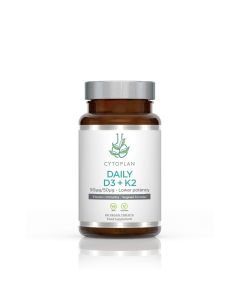What is Omega-7?
Omega 7 (Palmitoleic Acid) is a monounsaturated fatty acid that is part of the natural structure of the skin and mucous membranes of the body and, although not considered essential, its intake offers a range of health benefits. Including it in the diet is not always easy, since it is found only in certain foods and in small quantities. We can find it in cold-water fish, macadamia nuts and in avocado, as well as in tropical and other vegetable and marine oils, but its richest source is from the oil of berries from the Sea Buckthorn plant.
The mucous membranes – specialist epithelial tissue covering areas such as the digestive, respiratory, and urological tract, female genitalia and the inside of the eye, are very sensitive and any alteration can lead to a range of health problems. As such, maintaining the health of these membranes should be a consideration for overall health, and omega-7 can be supportive for their care.
Omega-7 can support those suffering with vaginal inflammatory atrophy (a thinning and drying of the vagina characterised by discomfort, feelings of dryness, burning and itching). Vaginal inflammatory atrophy affects up to 1 in 3 women, mainly during or after the menopause and is linked to low levels of oestrogen. Oestrogen is important for the structure of the urogenital area, where it maintains the elasticity and moisture of the epithelial barrier, but Omega 7 appears to reduce symptoms and improve vaginal health, without increasing circulating oestrogen levels – so could be an alternative treatment where hormonal therapy is inappropriate.
Dry Eyes
The benefits of omega-7 have also been demonstrated in dry eye syndrome. Dry eye is a common condition characterised by symptoms of visual disturbance and discomfort; notably a sensation of having sand in the eye, which manifests in tearing, blurred vision, burning, inflammation and redness. Artificial tears are a common treatment in dry eye. Although this relieves the symptoms, it does not address the causative factors or the inflammation that accompanies dry eye.
Omega-7 fatty acids can preserve tear secretion and suppress inflammatory cytokines in the tear gland.
Skin Health
Omega-7 is found in human skin, but its levels do deplete as we age.
Omega 7 can play an important role in wound healing, possibly because of its anti-inflammatory effect, reducing oxidative stress, increasing blood vessels and blood flow to the wound site and stimulating skin cell regeneration. Sea Buckthorn oil, a rich source of omega-7 can also support the reduction of scars.
Another effect of Omega-7 in skin and mucous health is related to its antibacterial action as a component of human sebum. Omega-7 has been shown to affect the growth of the yeast Candida albicans; an opportunistic organism which can become pathogenic when it is allowed to proliferate and become the dominant species. It may also prevent the adhesion of C. albicans to the skin, thus having the potential to reduce the risk of cutaneous candidiasis; a common fungal skin infection.
Cardiovascular Health
Omega-7 can support those with metabolic syndrome – a condition characterized by fat around the middle, dyslipidaemia, hypertension and high blood glucose levels as well as an increase in inflammatory markers. These symptoms can be modified by dietary changes, and one such change is the incorporation of monounsaturated fats such as omega 7 and 9, particularly when they replace saturated fatty acids.
Omega-7 may play a role in lowering total cholesterol levels, as well as LDL (“bad”) cholesterol. Studies have also demonstrated a reduction in total triglycerides and LDL cholesterol, and a significant increase in beneficial HDL cholesterol in those supplementing with Omega-7 for as little as 30 days.
Additionally, omega-7 can help to prevent insulin resistance and is linked to lower fat accumulation in the liver – so could be a helpful supplement to improve blood lipid and glucose levels and general cardiovascular health.






